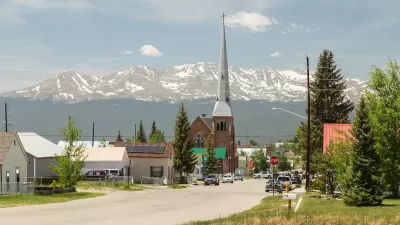Four states now have laws in place that prevent cities and counties from creating or continuing guaranteed income programs, and several more have tried or are trying.

“After years of momentum behind guaranteed income programs that disburse no-strings-attached cash, the backlash has arrived in force,” writes Sarah Holder in an article for Bloomberg.
More than 100 pilots have been launched in cities and counties across the United States since 2018. But this legislative session, lawmakers in South Dakota, Idaho, and Iowa passed legislation barring state and local governments from making guaranteed income payments. At least another seven other states have tried or are trying: Arkansas successfully banned localities from creating universal basic incomes in 2023; Arizona, Wisconsin, and Mississippi tried to pass similar legislation this year but failed; West Virginia has introduced a bill this year that has not yet come up for vote. Texas Attorney General Ken Paxon has also sued Harris County, which includes Houson, over its just-launched pilot, Holder reports.
Guaranteed income programs “distribute money at regular intervals to specific populations in need, like low-income residents, or new mothers or homeless youth. Unlike other social safety net programs, they don’t typically ask recipients to meet any conditions in exchange for the money or use it in particular ways. They are also said to be more efficient than other government programs saddled with red tape and administrative burdens,” writes Holder. Universal basic income follows the same principles, but all residents within a community, not just select populations, receive a set payment.
Opponents of these programs say they will deter people from working and say they are merely efforts to expand welfare. However, Holder reports increased full-time employment rates among participants in a guaranteed income program in Stockton, California, as well as reported improvements in participants’ physical and mental health in other pilots. Programs across the country, including a recent pilot in Austin, Texas, are also reporting increased housing stability among low-income recipients, who spent the majority of their payments on housing and other essentials like food.
FULL STORY: States Push Back Against Guaranteed Income With New Bans

Study: Maui’s Plan to Convert Vacation Rentals to Long-Term Housing Could Cause Nearly $1 Billion Economic Loss
The plan would reduce visitor accommodation by 25,% resulting in 1,900 jobs lost.

North Texas Transit Leaders Tout Benefits of TOD for Growing Region
At a summit focused on transit-oriented development, policymakers discussed how North Texas’ expanded light rail system can serve as a tool for economic growth.

Why Should We Subsidize Public Transportation?
Many public transit agencies face financial stress due to rising costs, declining fare revenue, and declining subsidies. Transit advocates must provide a strong business case for increasing public transit funding.

How to Make US Trains Faster
Changes to boarding platforms and a switch to electric trains could improve U.S. passenger rail service without the added cost of high-speed rail.

Columbia’s Revitalized ‘Loop’ Is a Hub for Local Entrepreneurs
A focus on small businesses is helping a commercial corridor in Columbia, Missouri thrive.

Invasive Insect Threatens Minnesota’s Ash Forests
The Emerald Ash Borer is a rapidly spreading invasive pest threatening Minnesota’s ash trees, and homeowners are encouraged to plant diverse replacement species, avoid moving ash firewood, and monitor for signs of infestation.
Urban Design for Planners 1: Software Tools
This six-course series explores essential urban design concepts using open source software and equips planners with the tools they need to participate fully in the urban design process.
Planning for Universal Design
Learn the tools for implementing Universal Design in planning regulations.
City of Santa Clarita
Ascent Environmental
Institute for Housing and Urban Development Studies (IHS)
City of Grandview
Harvard GSD Executive Education
Toledo-Lucas County Plan Commissions
Salt Lake City
NYU Wagner Graduate School of Public Service





























